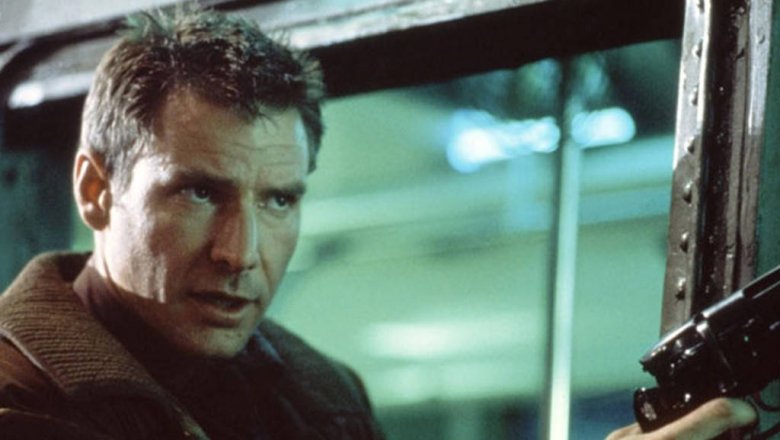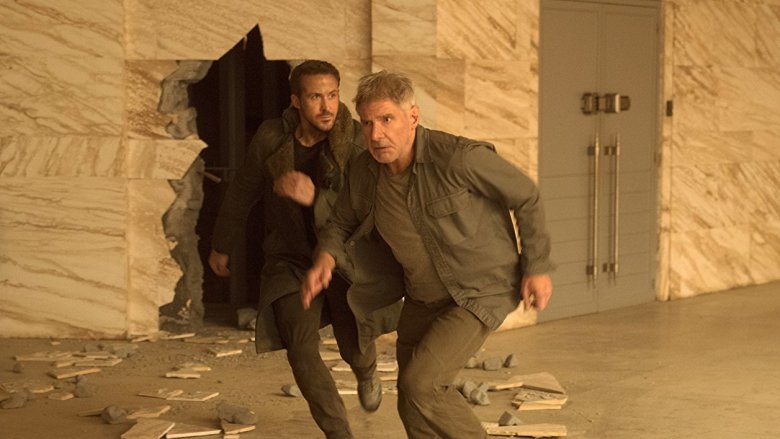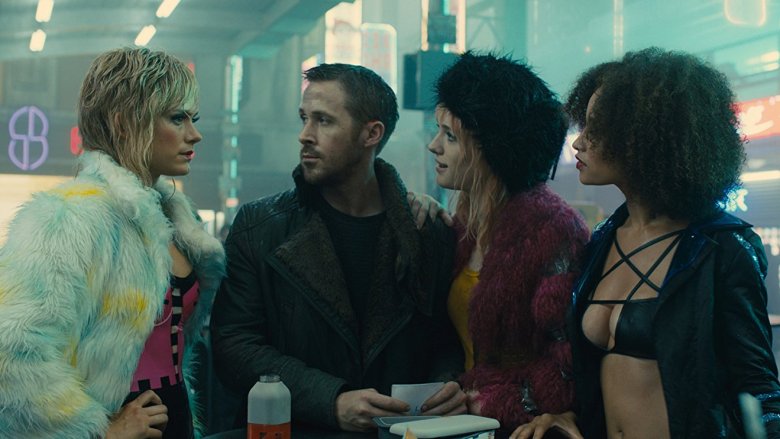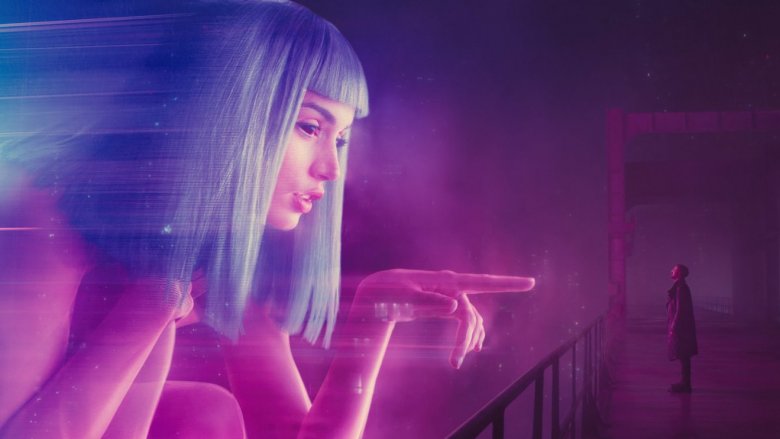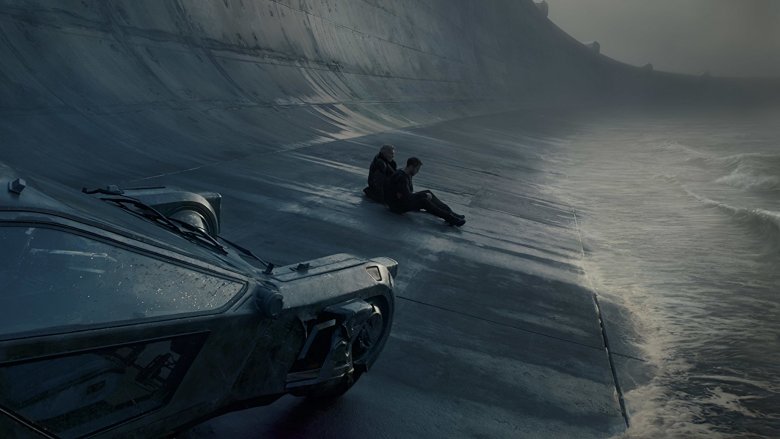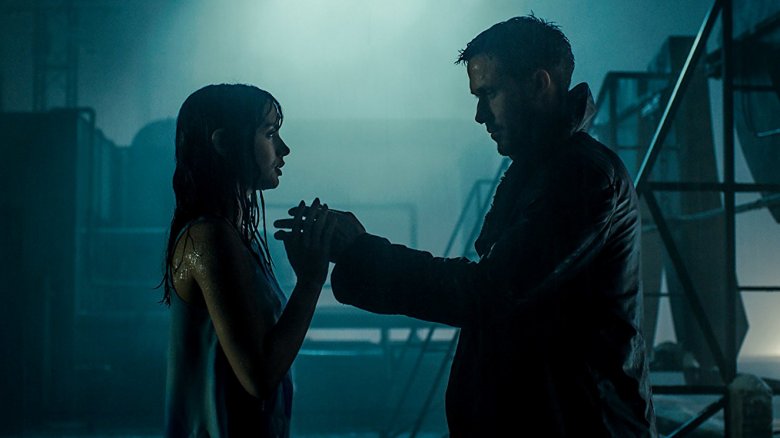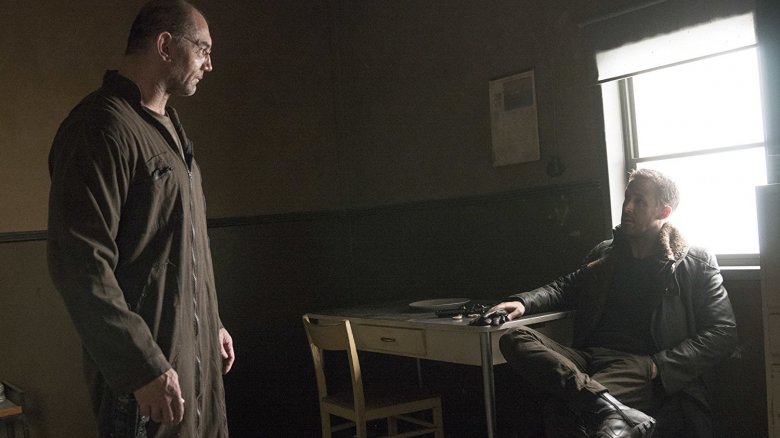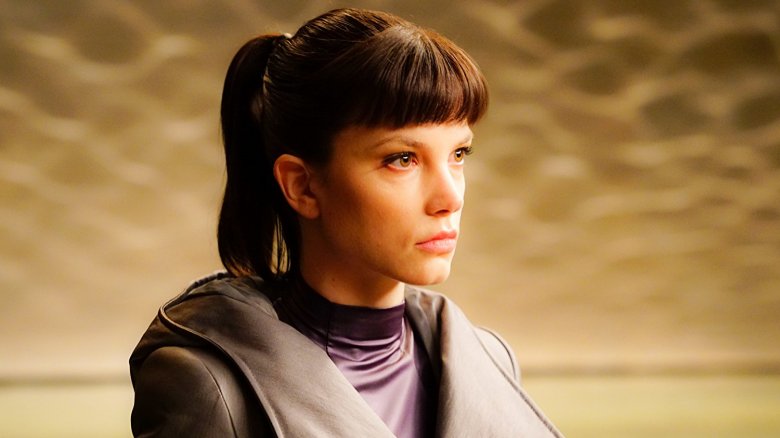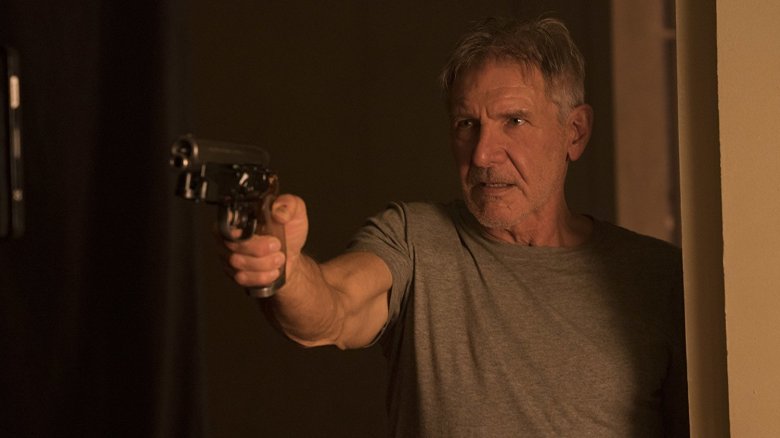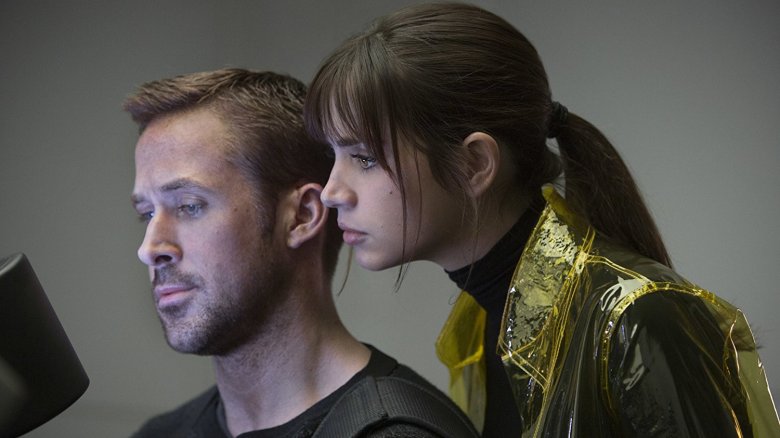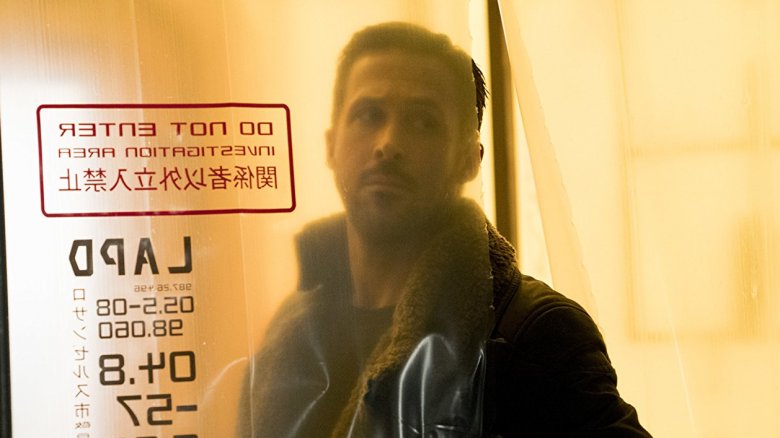The Real Reason Blade Runner 2049 Flopped At The Box Office
Blade Runner 2049 seemed like it was good to go headed into its opening weekend. Initial box office forecasts were bumped up from $40 to $45-$50 million, and the film brought in $4 million in previews, on par with similar sci-fi films that ended up with solid openings.
However, as the weekend went on, things unraveled. The long-awaited sequel brought in just over $12.7 million on Friday, and fell to just $11.4 on Saturday. The movie ultimately brought in just $31.5 million—dismal returns against a $150 million production budget.
It's even more surprising when you consider the fact that the movie earned rave reviews, many from critics who thought it was even better than the original. While it's tough to decipher precisely what went wrong with Blade Runner 2049, here are the many factors that turned it from a critical success into a box office failure.
The runtime was too long
Blade Runner 2049 comes in at a whopping 163 minutes—long enough to dissuade many casual viewers from a trip to the theater. While sci-fi fans might still be willing to spend that much time with the movie, those just looking for a fun time would probably be more in the mood for something that falls on the shorter side.
The less obvious problem, though, is that the runtime limits the number of showings that theaters can have in a day. Most big-budget blockbusters clock in around two hours, and that extra 45 minutes means less opportunity for profit, and could also spell trouble for the film further down the line as theaters may be tempted to drop the movie early, lessening its chance to build momentum over the next few weeks.
The first film wasn't a box office success
The basic premise of Hollywood's recent obsession with reboots is that capitalizing on familiar properties will make for big box office bucks. However, that idea rests in the popularity of the source property.
Blade Runner was not a strong box office performer. The film opened to small numbers in 1982, bringing in just $6.1 million in its opening weekend, good for second place after E.T.: The Extra Terrestrial. It stayed in theaters for just five weeks and went on to make $32.9 million total. While that comes to about $82 million today, it wasn't a huge box office performer, just the 27th biggest film of the year.
The source material isn't very familiar with younger viewers
While Blade Runner has gained a devoted cult audience since its original theatrical run, most of its name recognition rests among hardcore sci-fi fans, and that was reflected in the movie's box office turnout. Males over 25 represented 50 percent of the audience—and as a whole, men represented 71 percent of everyone who turned out. Females under 25 were just eight percent.
Warner Bros. domestic distribution chief Jeff Goldstein has said that the way to get past the movie's disappointing opening weekend box office will be to expand the audience beyond that core group of older men, but if they want to do that, they'll have to find a better way to reach younger viewers who aren't familiar with the source property.
And the movie wasn't designed to appeal to them
Even if younger viewers were familiar with Blade Runner, 2049 wasn't designed to appeal to them. The film was marketed as a blockbuster, but viewers expecting big action set pieces were disappointed to see that the movie plays out slow and reflective. While this is fitting with the source property and earned the love of many fans and critics, for some viewers, especially younger ones, it just wasn't the movie they were looking for.
This can be shown in comparing the CinemaScore given to the film by those under 25 to those over 25. While overall the movie holds an A- rating on the grading platform, males under 25 gave it a B, while the small group of viewers under 18 who saw it gave it a B-. Some hypothesize that this is because the film goes against the norms of a traditional blockbuster, something that made it a win with some, but a loss with many younger audiences.
It's confusing to get caught up
Blade Runner 2049 is far from the first continuation of a relatively obscure property, but it faced some unique obstacles—including the fact that there have been a number of different versions of Blade Runner released, and for the casual viewer, it can be tough to figure out which one to watch to get prepared for the sequel.
Getting caught up on Blade Runner before seeing 2049 meant committing to a lot more than just watching one movie. Most people recommended that viewers see a few different versions of the film, including the original and the 2007 director's cut, before heading out to theaters. Add that all on top of the nearly three-hour runtime, and it's easy to see why some people opted not to make room in their busy schedules for 2049.
It may have been too faithful
There's a lot of complicated mythology at play in the Blade Runner films. Many fans and critics were delightfully surprised to see how well the sequel dealt with it, with the film answering and expanding on some of the deeper questions asked in the original.
However, that type of introspection and that deep connection to the mythology makes it daunting for the unconverted. The mythos of Blade Runner is so deep and complicated that it can keep casual viewers at arm's length—and 2049 may have hewn too close to the source material to have the kind of mass appeal it was aiming for.
The marketing was vague
One common thread among recent box office flops is marketing that focuses on visuals over substance. Thanks to big flops like Valerian and the City of a Thousand Planets and Ghost in the Shell, audiences have grown wary of bad films being disguised with sweeping camera shots and a big budget.
While this didn't end up being the case with Blade Runner 2049, the trailers might not have drummed as much buzz as they could have thanks to their decision to highlight the movie's looks over its plot. Warner Bros. publicity head Dennis Higgins said they did it because "literally, the plot of the movie is a spoiler," but this did them no favors in terms of bringing in viewers unfamiliar with the source material.
While this was likely also a practical decision considering how hard the movie's plot is to boil down into a couple of minutes, in the end, going with a clearer marketing strategy may have helped sell the movie to the mainstream market.
Fans had mixed reactions
Taking the A- CinemaScore at face value suggests fans loved Blade Runner 2049, although digging a little deeper into the audience reaction tells a different story. Social media monitor Relish Mix says fans were mixed in their reactions online, with some criticizing its length and the need to see the original. On top of that, while Twitter mentions increased throughout the weekend of the movie's release, they didn't go up as much as they generally do for sci-fi movies, hinting that the film couldn't get audiences talking as much as it needed to.
The movie holds an 84 percent audience score on Rotten Tomatoes and an 8.6 out of ten on IMDb's user reactions, so it's not that audiences turned away from the film entirely. However, people who weren't fans of the original may have come out feeling confused, putting a damper on the all-important word of mouth.
There was a lot of R-rated competition
Blade Runner 2049 had trouble with young audiences, and that may be in part thanks to its R rating. After years of shying away from adult-oriented fare, studios have been more willing to embrace it lately—in fact, it seems like those films are flooding the marketplace. 2049 had to stand up against R-rated competition like It, American Assassin, and Kingsman: The Golden Circle, all of which were much easier to digest than Blade Runner. Going for a less strict rating would have helped to cut out some of the competition—and likely wouldn't have seriously cut into the film's quality considering the movie's fairly tame for R-rated content.
Asia may be its only hope
Blade Runner 2049, like many a domestic flop, now turns to the international box office for salvation. The movie brought in $50.2 million overseas, just about on par with expectations, although not enough to make up for its domestic failure.
The movie's biggest hope lies in Asian markets, where it will roll out in South Korea on Oct. 12, Japan on Oct. 27, and China on Nov. 10. These are all markets that are more friendly to movies with big-budget visuals. If the film is able to bring in big bucks overseas, it could still be profitable.
Its budget was bigger than it had to be
Blade Runner was made on a big budget for its time. The film cost a reported $30 million, which, when adjusted for inflation, translates to $76 million today. Blade Runner 2049 is believed to have cost twice that amount, after tax rebates. Those who have seen the film can attest to what the budget of that size allowed them to do—the movie is gorgeous, with sweeping visuals that are sure to earn a lot of nominations come awards season.
However, while that budget clearly helped with quality, when it comes to making a profit, a budget that high was probably not a smart decision. Looking at the film's appeal based on the original movie's box office and how recognizable the source property is, it's hard to imagine Blade Runner 2049 doing big enough business to make a profit on a budget that high.
Still, though, spending the extra dough to get critics in their corner and to make the movie a visual feast could end up being a smart decision in the long run. Some think Blade Runner 2049 could be the Mad Max: Fury Road of this year's awards season, sweeping the technical categories and giving it a second life thanks to renewed buzz later on.
In the end, this was a niche movie with a budget that meant it had to have widespread appeal. While a more modest budget would have made the movie less of a box office risk, we'll have to wait to see how shelling out that much cash plays out in the future.
Profit may not have been the point
Hollywood is a business, but making big bucks isn't always what matters when making a film. Director Denis Villeneuve teased as much months before Blade Runner 2049's release, saying he realized very early on that the chance of the movie succeeding was "narrow."
"I came on board because the script was very strong," he said. "But no matter what you do, no matter how good what you're doing is, the film will always be compared to the first, which is a masterpiece. So I made peace with that. And when you make peace with that you are free."
Villeneuve ended up making a film that, according to many, did end up living up to the original, so he can cross that off his list. That worthy goal, for many reasons, might have prevented him from achieving box office success, but that might not have been the point. Blade Runner 2049 was about quality cinema—and on that front, Villeneuve and his team most definitely succeeded.

